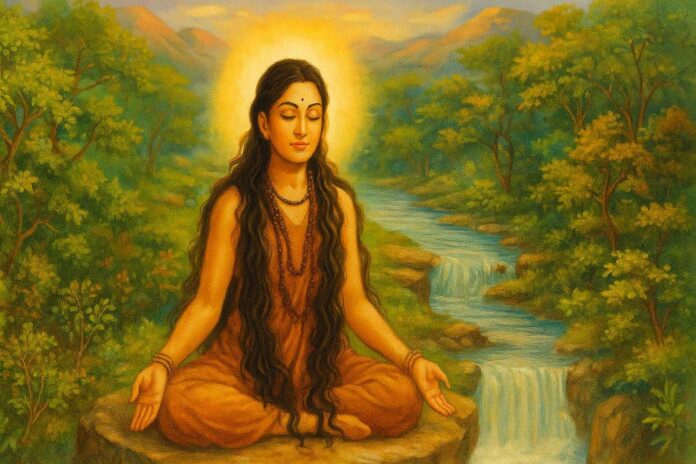Sant Lalleshwari, also known as Lal Ded, Lalla Yogeshwari, or simply Lalla, was a 14th-century Kashmiri mystic, poetess, and saint whose teachings transcended religious boundaries and inspired both Hindus and Muslims alike. Her spiritual insights, expressed in her native Kashmiri language through mystical verses called “Vakhs”, continue to enlighten seekers across generations.
Early Life and Background
Birth: Circa 1320 CE
Birthplace: Pampore, Kashmir (India)
Religion: Hindu (Shaivism – Kashmiri Shaiva philosophy)
Lalleshwari was born into a Brahmin family and was married at a very young age, as per the traditions of that era. Her married life was deeply troubled—filled with neglect, emotional abuse, and misunderstanding. These harsh realities led her to seek solace beyond the material world.
She eventually left her home to embark on a spiritual journey in search of truth and liberation. Rejecting societal norms, Lalla chose a life of renunciation and inner realization.
Spiritual Journey and Enlightenment
Lalleshwari became a disciple of Siddha Srikanth, a renowned master of Kashmir Shaivism. Under his guidance, she studied Shiva Yoga, tantric practices, and mystical philosophy that emphasized the experience of the divine within.
She wandered across Kashmir, often in a naked or semi-naked state, symbolizing her detachment from worldly norms and ego. This radical lifestyle shocked many, yet gradually people began to see her not as a madwoman, but as a realized soul, a living embodiment of divine wisdom.
Teachings of Sant Lalleshwari
Lalleshwari did not write scholarly texts; instead, she expressed her wisdom in the Kashmiri language through spontaneous, soul-stirring couplets called “Vakhs”. These vakhs are profound spiritual statements based on her direct experiences with the inner self, the soul, and the divine.
Key Teachings:
God is omnipresent – not confined to temples or mosques.
Inner realization is more important than rituals.
Let go of ego to know the Self.
Truth is beyond religion – it resides in experience and love.
Her teachings were rooted in non-duality (Advaita) and closely aligned with the Kashmir Shaiva tradition, yet they also resonated with Sufi mysticism and universal spirituality.
Selected Vakhs (Mystic Verses)
One of her most quoted vakhs illustrates her inclusive and universal vision:
“Shiv chuy thali thali rozan, mo zan Hyund ta Musalman.”
Translation: “Shiva dwells in all things—why call one Hindu, another Muslim?”
This verse became a symbol of unity and tolerance, breaking down barriers between religions, castes, and social norms. Her poetry was a call to see the divine in everyone and everything.
Influence on Sufi Mysticism
Lalleshwari’s impact went beyond the Hindu tradition. Her mysticism influenced Kashmiri Sufi saints, especially Sheikh Noor-ud-din Noorani, also known as Nund Rishi. He considered Lalla his spiritual mother.
Her teachings laid the groundwork for a syncretic spiritual culture in Kashmir, where Hindu Shaivism and Muslim Sufism found common ground in mysticism, simplicity, and love.
Legacy of Sant Lalleshwari
Lalleshwari is not just remembered as a saint, but as a revolutionary figure in the spiritual history of India.
She gave Kashmiri language its first literary form.
She is revered as the mother of Kashmiri poetry.
Her vakhs are considered foundational texts in Kashmir’s spiritual literature.
She continues to be a symbol of feminine strength and spiritual awakening.
Her legacy is preserved in Kashmir through oral tradition, folk songs, school syllabi, and public memorials. Even today, both Hindus and Muslims in Kashmir regard her with immense respect and devotion.
Relevance in the Modern World
In a world torn by religious divisions and identity-based conflicts, Sant Lalleshwari’s message of unity, inner realization, and divine love is more relevant than ever. She reminds us that spirituality is not about labels, attire, or rituals—but about awakening to the presence of the divine within.
Conclusion
Sant Lalleshwari was far ahead of her time. She broke social conventions, renounced worldly life, and illuminated the path of self-realization through her lived experience. As a mystic poetess, a yogini, and a symbol of divine femininity, she remains an eternal light in India’s spiritual landscape.
Her vakhs continue to echo the message that:
“God is within you. Know thyself, and you shall know all.”

